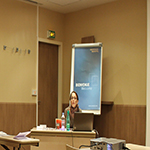Euroacademia Conferences
 Europe Inside-Out: Europe and Europeanness Exposed to Plural Observers (9th Edition) April 24 - 25, 2020
Europe Inside-Out: Europe and Europeanness Exposed to Plural Observers (9th Edition) April 24 - 25, 2020 Identities and Identifications: Politicized Uses of Collective Identities (9th Edition) June 12 - 13, 2020
Identities and Identifications: Politicized Uses of Collective Identities (9th Edition) June 12 - 13, 2020 8th Forum of Critical Studies: Asking Big Questions Again January 24 - 25, 2020
8th Forum of Critical Studies: Asking Big Questions Again January 24 - 25, 2020 Re-Inventing Eastern Europe (7th Edition) December 13 - 14, 2019
Re-Inventing Eastern Europe (7th Edition) December 13 - 14, 2019 The European Union and the Politicization of Europe (8th Edition) October 25 - 26, 2019
The European Union and the Politicization of Europe (8th Edition) October 25 - 26, 2019 Identities and Identifications: Politicized Uses of Collective Identities (8th Edition) June 28 - 29, 2019
Identities and Identifications: Politicized Uses of Collective Identities (8th Edition) June 28 - 29, 2019 The European Union and the Politicization of Europe (7th Edition) January 25 - 26, 2019
The European Union and the Politicization of Europe (7th Edition) January 25 - 26, 2019 7th Forum of Critical Studies: Asking Big Questions Again November 23 - 24, 2018
7th Forum of Critical Studies: Asking Big Questions Again November 23 - 24, 2018 Europe Inside-Out: Europe and Europeanness Exposed to Plural Observers (8th Edition) September 28 - 30, 2018
Europe Inside-Out: Europe and Europeanness Exposed to Plural Observers (8th Edition) September 28 - 30, 2018 Identities and Identifications: Politicized Uses of Collective Identities (7th Edition) June 14 - 15, 2018
Identities and Identifications: Politicized Uses of Collective Identities (7th Edition) June 14 - 15, 2018
The European Union Common Security and Defence Policy Re-visited. EULEX-Kosovo a Test for a Common Peace Educational Policy
-
-

-
Presentation speakers
- Nicasia Picciano, University of Flensburg, Germany
- Download presentation
Abstract:
The application of EULEX (European Union Rule of Law) in Kosovo has been so far the largest ever civilian mission deployed by the European Union, as part of its Common Security and Defence Policy (CSDP). Its main responsibilities per mandate (Council Joint Action 2008/124/CFSP) are to monitor, mentor and advice the local authorities in the police, justice and customs field and it is the first EU CSDP mission to be endowed with ´some executive powers´. Parallel to these peace-building functions, EULEX is also deemed to ´further strengthen and develop multi-ethnicity´. This task is broadly stated while leaving an ample margin of interpretation of how (with regard to the tools) the mission´s mandate is going to be achieved in practise.The starting point of this research is the multi-ethnicity concept for various reasons: (1) EULEX first programme report (2009) set the ethnicity component as the weakest one among various indicators. The second programme report (2010) did not refer to the multi-ethnicity issue and so did the third programme report (2011). Is this silence a proof that multi-ethnicity has been achieved throughout Kosovo? The situation in northern Kosovo, which erupted from the summer 2011 and escalated in October and November 2011, and again in January 2012, is a counter-demonstration of that. Multiethnicity is after all at the basis of the Kosovo Constitution (adopted as of June 2008) that is the ground where to built its own foundation. The main argument is that Kosovo will challenge the way the European Union Common Security and Defence Policy deals (or not) with multi-ethnicity. Instead of being a new holding operation, the EU should start differentiating and prioritizing. The suggestion is a new operational practice, I label Common Peace Educational Policy, which is feasible via an agreement at the CivCom (Civilian Committee) level and without implying a change in the Lisbon Treaty. A Common Peace Educational Policy is not deemed to be a solution of all problems but it is a good starting point, and this is what this research aims at providing for.
-
Related Presentations

Theoretical Perspectives for the EU Presence in the UN Institutional Structure
- Julija Brsakoska Bazerkoska

Euroscepticism Amongst Youth in Serbia and Croatia As An Extreme Form of Strategic Coalition
- Astrea Pejović and Jovana Papović

The Role of External Perceptions in the European Identity Formation
- Irina Khayrizamanova

How cosmopolitan is European Identity?
- Alexander Kustov














